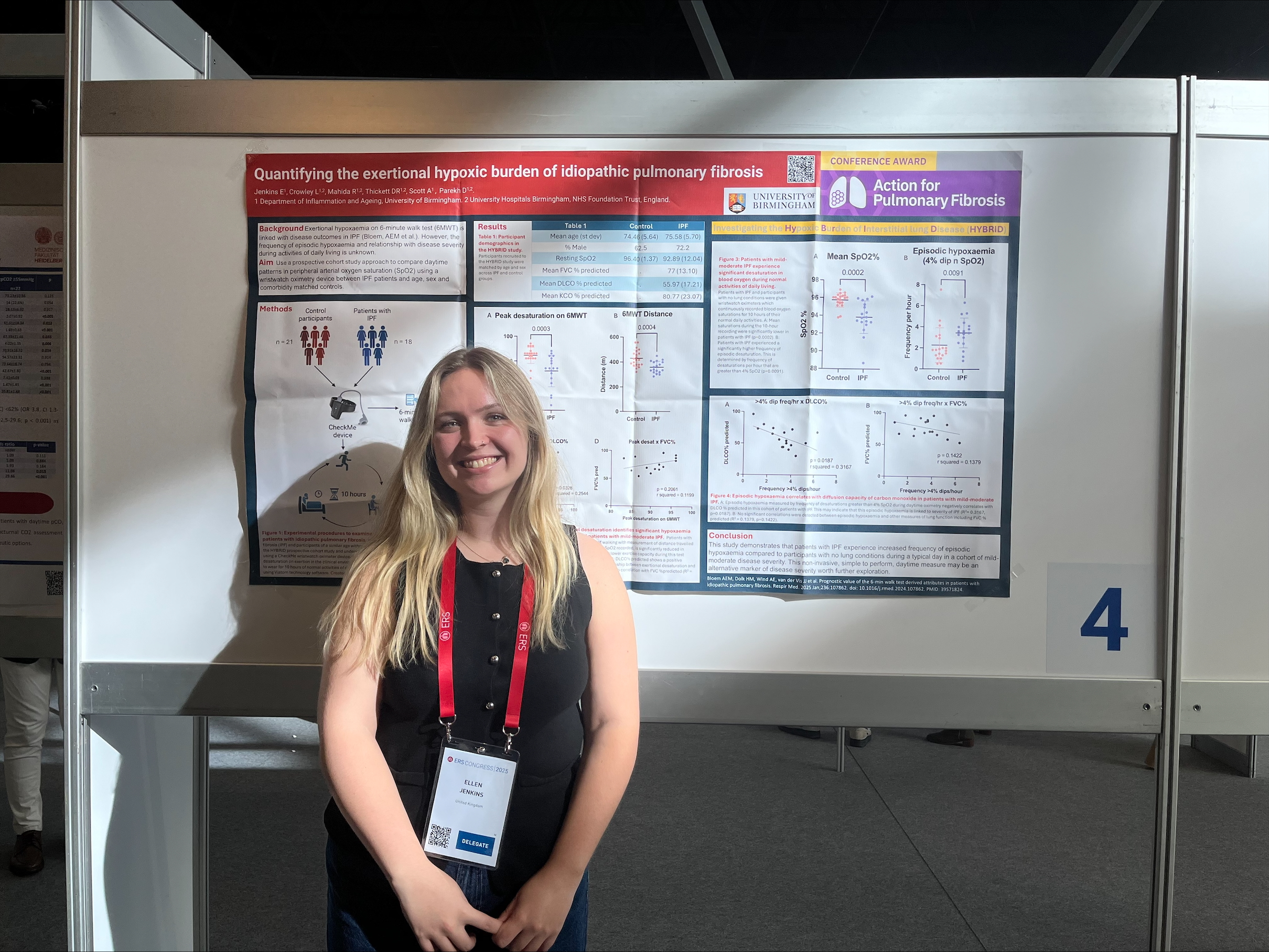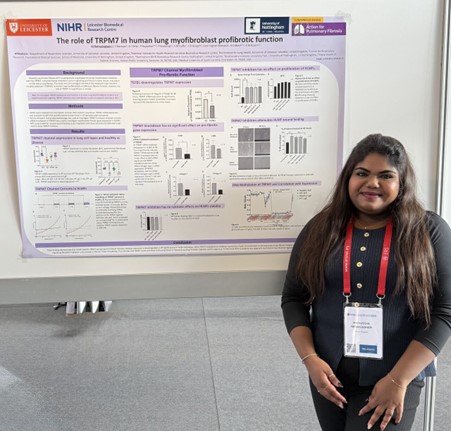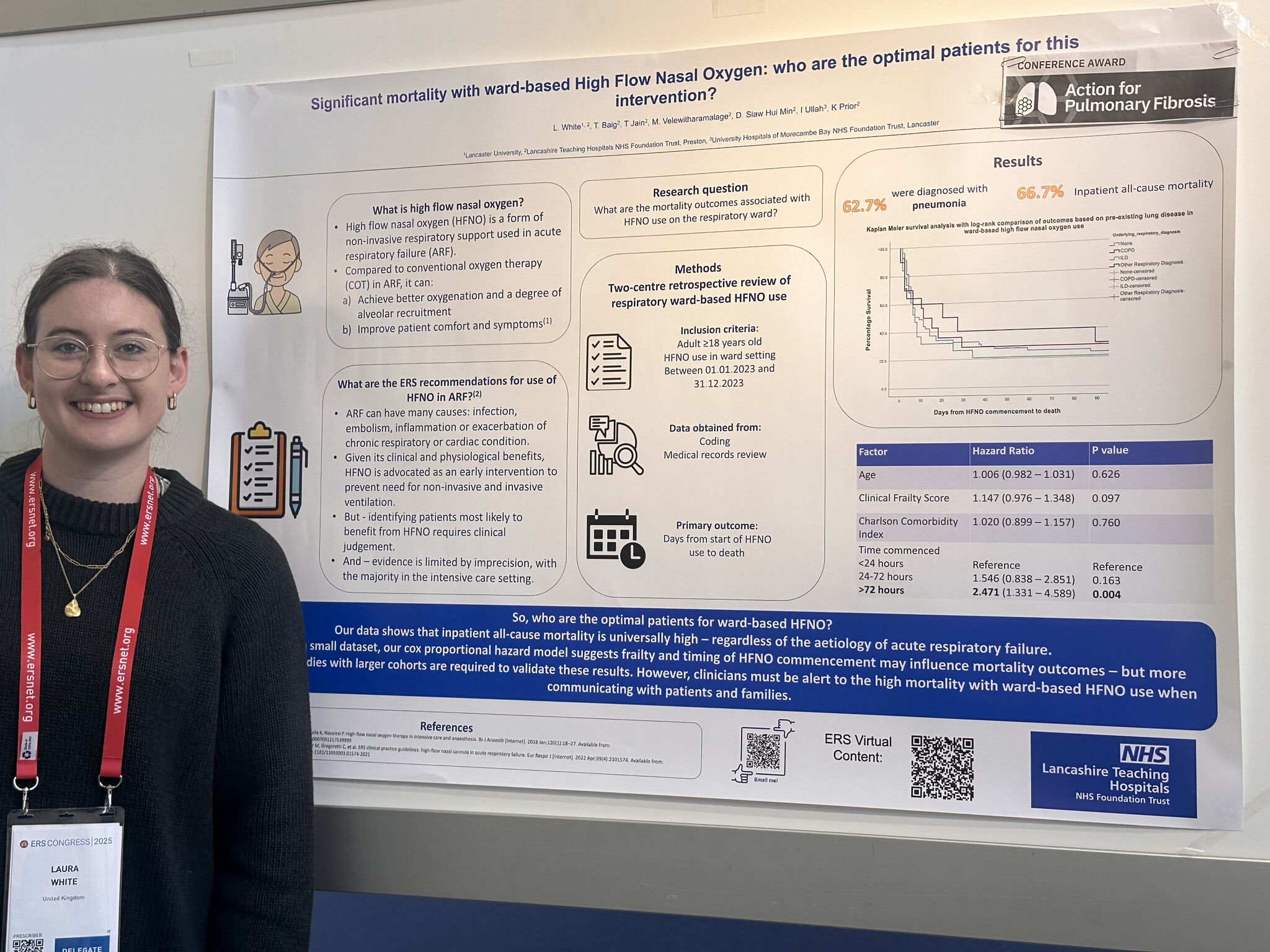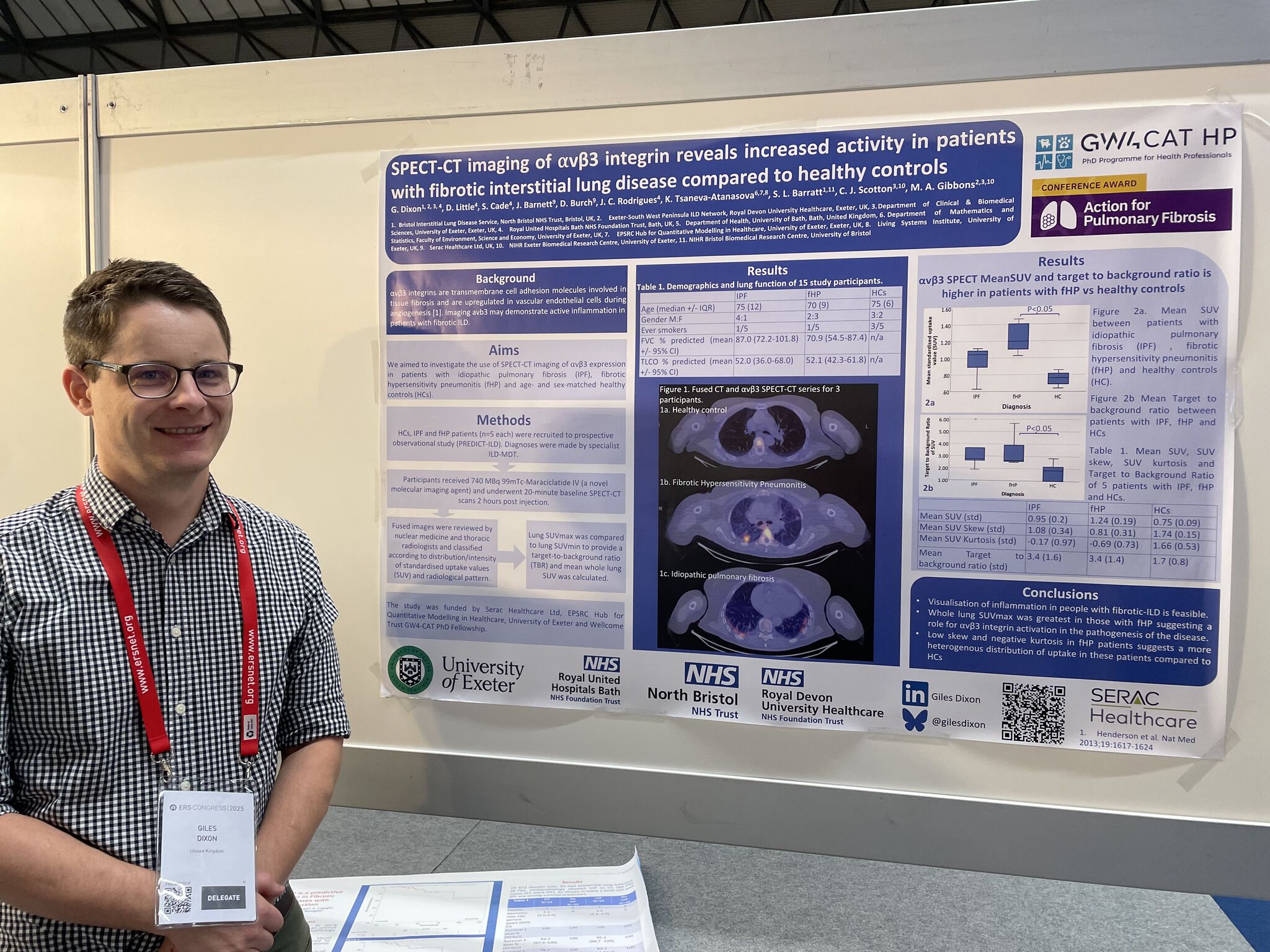Action for Pulmonary Fibrosis (APF) is proud to support four outstanding researchers who have each won an APF Conference Award. The award gives them the opportunity to present their work at the European Respiratory Society (ERS) Congress 2025 in Amsterdam, one of the largest gatherings of lung health experts in the world.
An APF award enables promising early-career researchers to present their findings, engage with international experts and bring back knowledge that can accelerate progress in understanding Pulmonary Fibrosis (PF) and the development of potential future treatment options.
Each of the projects tackle pulmonary fibrosis from different angles:
- how oxygen levels change in daily life
- discovery of a new protein target for treatment
- social background and hospital outcomes
- innovative ways to predict disease progression.
Together, their findings shine alight on what patients face while pointing to better care and future treatments.
Meet the researchers
Ellen Jenkins, University of Birmingham

Oxygen levels in daily life: more than just during exercise
Many people with idiopathic pulmonary fibrosis (IPF) experience low oxygen levels during exercise. But what about during normal day-to-day activities?
In this study, people with mild or newly diagnosed IPF wore oxygen monitors during exercise tests and throughout their everyday routines. The results showed that oxygen dips were common, even during simple daily activities, and these dips were linked to worse lung function.
This is important because low oxygen may not just be a symptom, it could potentially contribute to the scarring process itself. The findings could influence when oxygen therapy is offered and guide new treatments that protect the lungs from low-oxygen damage.
Lived Experience Comment
I’ve often felt breathless just doing small tasks around the house, but tests at the hospital don’t always capture that. It’s reassuring to see research that reflects what life with IPF is really like.
Mathuscha Ratnasingham, University of Leicester

TRPM7: A new target for medicines
Current treatments for IPF can slow down scarring but are often hard to tolerate. Mathuscha’s project explored a protein called TRPM7. Proteins are large molecules which are essential for the cells in our bodies to work properly. TRPM7 helps control how lung cells grow and respond to signals.
Mathuscha discovered that there was less TRPM7 in lung tissue from IPF patients. This meant that when the protein was blocked in the lab, the cells produced fewer of the substances that cause scarring and were less able to repair wounds, which is a key process in fibrosis.
The results suggest TRPM7 could be an important piece of the puzzle in understanding what goes wrong in IPF. It could offer an exciting new target for medicines, raising the possibility of more effective treatments in the future.
Lived Experience Comment
The current medicines help, but the side effects can be tough. Knowing that researchers are exploring new ways to treat fibrosis gives me hope for treatments that are kinder and easier to manage in the future.
Dr Laura White, Lancaster University

Social Background and Hospital Outcomes
Interstitial lung diseases, including PF, can suddenly get worse, often leading to hospital admission. Previous research has shown that people from poorer backgrounds die earlier from these diseases. But does social background also affect survival in hospital?
Laura looked at data from hospital admissions between 2017 and 2019. She found that the risk of dying during, or shortly after, a hospital admission was high for everyone: over 15% of patients died in hospital, and nearly 40% within three months. While more patients came from poorer areas, social background did not affect the risk of dying once admitted.
This raises new questions: why are more people from poorer areas being admitted to hospital in the first place, and how can we better support them?
Lived Experience Comment
Being in hospital with lung disease is frightening, no matter who you are. It’s encouraging to know that researchers are looking at fairness and making sure everyone gets the same chance of good care.
Dr Giles Dixon, University of Exeter

Predicting Disease Progression: Innovative Tools
Giles is presenting three research projects at ERS 2025, focusing on Finding better ways to predict outcomes and track the illness in people with PF
- Assessment of the body’s small blood vessels: Using a small camera, researchers examined the blood vessels under the tongue in patients with IPF, other forms of PF, and healthy individuals. Patients were comfortable having the test and there was a suggestion that patients with IPF had signs of abnormal blood vessels under the tongue. This may help us understand why pulmonary fibrosis progresses over time.
- SPECT-CT scan for lung inflammation: A specialist scan measuring inflammation in the lung was tested in patients with IPF and chronic hypersensitivity pneumonitis. The scan highlighted areas of inflammation even in scarred lung regions, suggesting potential for personalised treatments for people with PF. This was the first time this scan has been used in people with pulmonary fibrosis, and the results will help shape future studies.
- Artificial intelligence (AI) and CT scans: AI was used to analyse 3 CT scans performed every 6 months in 36 patients over one year. The study aimed to understand how changes in AI reflect how patients feel, function and survive. The study found that AI findings closely matched with lung function and symptoms and helped predict survival at one year. This work demonstrated that routine CT scans combined with AI, could offer information that can help personalise treatments and aid discussions about prognosis for people with pulmonary fibrosis.
Lived Experience Comment
Not knowing what the future holds can be a scary thought. It’s helpful to know what might happen with my disease over time. Research like this makes me feel hopeful that there is work happening which could lead to people understanding more about their condition and what might gradually happen.
Why This Matters
These four projects highlight the importance of research in tackling pulmonary fibrosis from every angle: biology, everyday impact, healthcare systems, and disease prediction. Thanks to the APF Conference Award, these researchers are sharing their findings with experts worldwide at the ERS Congress, helping to drive progress and raise awareness on an international stage.
Bradley Price, Director of Policy, Research and Involvement:
We are incredibly proud to support these talented researchers. Their work not only pushes forward scientific understanding but also addresses the real challenges people affected by pulmonary fibrosis face every day. By sharing their findings at the ERS Congress, they are helping to put pulmonary fibrosis firmly on the global research agenda.
By supporting researchers and celebrating their work, APF is helping to bring us all closer to better treatments and fairer care for everyone affected by pulmonary fibrosis.
Each of these research projects have raised new questions which need to be explored and answered. You can help make a difference today and help us fund more research:
Donate: Every gift, no matter the size, helps continue our vital work. Your donations fuel progress in research, care, and support for people living with pulmonary fibrosis. Thank you.
Sign Up for a Fundraiser: Organise a fundraising activity and contribute to our work in a fun and meaningful way.
Explore more:
